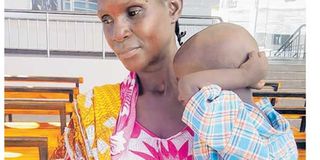Endless struggle of a single mom to save her son

Upendo Lukongo, 40, a mother of six children had never imagined that she will one day end up spending months at a heart facility until when her last born child was diagnosed with a heart condition that necessitated prolonged medication and surgery.
Ms Lukongo, a small-scale farmer from Mwakikonge village in Tanga Region narrates to Your Health about her struggles of seeking treatment for her three-year-old son, Richard.
“My other five children grew up healthy and had never developed any serious illness except my last born. At the age of three months, he started developing surprising symptoms; he was crying a lot all the time. I was confused,” says Ms Lukongo.
But when she took him to a nearby hospital, the doctors could not detect any serious condition or ailment. With persistent symptoms, it prompted the doctor to transfer them to the Muhimbili National Hospital (MNH) for specialised medical check-up.
At the MNH, the hospital results showed that the child had an enlarged heart, something he was born with, a symptom of an underlying problem that is causing the heart to work harder than normal, biologically known as cardiomegaly, and it necessitated prolonged medications. They were transferred to Jakaya Kikwete Cardiac Institute (JKCI) for specialised care. “We were admitted in the hospital for one month, and then we were discharged. The doctor instructed us to report to the hospital after every six months for clinic sessions,” Ms Lukongo narrates to Your Health.
The heart condition
“It can also be seen in children but is less common, as it normally occurs in adults. Many of the children that we receive here are diagnosed with other types of heart defects such as heart valve disease,” said the JKCI’s Paediatric Cardiologist, Dr Sulender Kuboja.
In some people, an enlarged heart causes no signs or symptoms. Others may experience shortness of breath, abnormal heart rhythm and swelling, according to the health experts.
According to Dr Kuboja, some cases of enlarged hearts in children are caused by valve problems.
“Valves that don’t open properly, or valves that leak can create extra stress on the heart, resulting in enlargement,” explained Dr Kuboja.
Start to a difficult journey
In December, 2018, when Ms Lukongo and her son were preparing to attend the clinic session as instructed, she fell sick, a situation that had forced them to skip the clinic session.
“I am a mother and a father of this family. My husband had died when our last born was only three months old. So when I fall sick, no one is taking care of my children, I therefore need to be strong even when I feel weak,” says Ms Lukongo.
On February 13 this year, Ms Lukongo took her son to JKCI for a clinic session.
The hospital results had shown that her child’s heart had grown bigger; the doctor advised them to come back the next day for a second screening.
“The doctor has told us to come back tomorrow. He also gave me a list of medicines to buy from the pharmacy, but unfortunately I don’t have money,” says Ms Lukongo.
Ms Lukongo is currently at JKCI waiting for her son to undergo a rare surgery. This follows, the doctor who examined the child had advised that Richard must undergo a surgery in order to treat the condition.
“I don’t know when exactly the doctors will perform the surgery, but we have been told to wait as they still continue to examine the condition,” says Ms Lukongo.
The JKCI’s Paediatric Cardiologist, Dr Naiz Majani was recently quoted by The Citizen saying children with correctable heart defects in Tanzania often fail to undergo surgeries because of lack of financial support.
Treatable but costly
The JKCI public relations officer, Anna Nkinda told Your Health over telephone that most of the children with heart defects who are visiting the institute, their treatment costs are covered by the facility.
“We normally contribute the treatment costs for the children and adults who are referred here for treatment coming from poor families after they are being assessed by our Social Department for financial support,” said Ms Nkinda.
She added, “For example, the treatment cost for children with heart valve disease is Sh15 million. But I am not sure about the treatment cost for children with enlarged heart condition.”
Free treatment?
The national health policy doesn’t stipulate that all heart disease patients visiting the JKCI should access free treatment. Under this course, majority of the patients have to dig in their pockets to cover the treatment costs.
When contacted over telephone, the deputy minister of Health, Community Development, Gender, Elderly and Children Dr Faustine Ndugulile elaborated that the government was currently providing free medical services to at least 60-70 per cent of Tanzanians categorised into different groups including cancer and heart patients.
“Treatment for heart diseases is very expensive and there isn’t any country that provides free medication for cardiovascular diseases. Therefore I can’t promise anything at the moment concerning free medical services for heart diseases,” said Dr Ngudulile when he spoke to Your Health.
The minister further reiterated that the government was determined to continue raising public awareness on importance to avoid engaging in lifestyle factors such as smoking and unhealthy eating that constitute diverse of health complications including cancer to the consumers.
“Through the Health National Policy, the government is committed to prevent and offer treatment for Non-Communicable Diseases like cancer and cardiovascular,” said Dr Ndugulile.
Treating heart defects extended
The government is intending to extend its expertise on cardiovascular treatment to other facilities throughout the country, in a bid to improving the cure of heart ailments.
Recently the government through health ministry launched a Cardiac Catheterisation Lab or “Cath Lab” for heart treatment at Dodoma based-Benjamin Mkapa Hospital in efforts to extend heart treatment across the country.
At JKCI, the management secured funds from the government to construct a new facility to accommodate children with heart defects visiting the institute.
“The aim is to reach out to as many heart patients as we can by availing similar services in other facilities in the country including Benjamin Mkapa and Bugando Hospitals,” said Prof Mohamed Janabi who was quoted recently.
Adding: “Previously, the institute could only conduct surgeries by 30 per cent, but with the support that we have been receiving, now 65 per cent of all heart surgeries are being done by our experts and the remaining 35 per cent with assistance of medical teams from abroad,”
Prof Janabi further asserted that the assistance has enabled the country to save up to Sh70 billion by performing rare heart surgeries on 2,440 patients in the past four years, both children and adults who were suffering from heart diseases, instead of transferring them abroad.
“Our goal is to reach as many patients as we can by the year 2020,” Prof Janabi was quoted.
As for Ms Lukongo, what’s left is hope to save her son Richard from a correctable birth defect while she awaits either for a financial aid or her turn to be one of beneficiaries of free treatment.
This is the reality many Tanzanian families face in treating unexpected ‘expensive’ diseases and illnesses.




